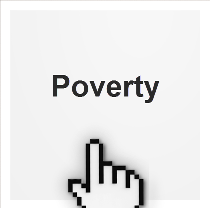Today we are following-up on the first half of Paul Mooney’s very interesting workplace management advice on dealing with poverty. 
Yesterday, Paul shared his thoughts on a topic that is rarely discussed in business – managing people from a low socio-economic background.
To see the first half of this article, click here: workplace management advice.
Over to Paul . . .
Interesting Workplace Management Advice – Dealing With Poverty – Part 2
This week, I want to bring you on this journey that goes back a couple of years. Picture the scene. I was about to ‘pull the trigger’ on a guy that reported into me. He had been underperforming for quite a while and had recently stepped over the line. I was meeting the Full-Time Union Official – simply as a courtesy – to tell him what was about to happen. After he’d heard the details, he made the point: “Why don’t you give him a break. That guy was born with a rusty spoon in his mouth. ”
Poverty Explained
It was a graphic description of poverty and a timely reminder that not all of us have equal privilege. The question around why some people are poor is one of the perennial debates in sociology. A number of structural causes are normally put forward to explain why individuals find it difficult to escape the poverty trap. These include:
To see the causes in the previous article, click here: workplace management advice.
Moral Fibre
There is an alternative right wing view that sees poverty as an outcome of the absence of moral fibre (essentially, a lack of character).
This includes a fear of working hard, acceptance of state handouts, using money for immediate pleasure, substance abuse and so on.
Evidence for this is often grounded around stories of individuals who started out in poor circumstances, but managed to scramble up the mountain and become successful.
Those individuals sometimes love telling their own ‘rags to riches’ story a la Bill Cullen.
Indeed, this view of the world has some universal appeal.
It makes the rest of us feel ‘We’ve earned our success’ (better than admitting we were just lucky to be born into a particular family and social strata).
Overall, the ‘lack of moral fibre’ argument is a minority view as an explanation for poverty.
The general consensus in the literature is that (a) there will always be exceptional individuals who can overcome adversity (b) for every career that poverty ‘supports’, it blights 100 others.
To summarize, while there are elements of truth in both perspectives, poverty can be better understood by a range of structural factors rather than being the outcome of individual underperformance.
John Lonergan was the former Governer of Mountjoy Prison in Dublin. He regularly said: “It’s not just a coincidence, that most of the inmates come from 4 or 5 postal districts”.
Tackling Underperformance
In organizations, a similar debate sometimes takes place when underperformance occurs.
When an organization (entire business or a particular section) underperforms, the question ‘why’ is raised.
In broad terms, underperformance occurs for one of two reasons. A range of ‘structural reasons’ can negatively impact performance or it can be down to a lack of individual effort or talent.
The structural elements can include changing market conditions, new regulations, key competitor moves, lack of talent in the organization (a failure of previous leadership) and so on.
Professor Charles McCarthy (RIP) in Trinity College, in his book The Decade of Upheaval declared: “Very often, the events were too great for the men”. McCarthy understood that the wave is sometimes bigger than the swimmer and people cannot always cope with this. At other times, it’s absolutely correct to take someone off a project or take them out of the organization entirely.
Central Point: ‘Underperformance’ is typically diagnosed as a lack of individual talent.
However, just like the poverty example cited, there are often hidden structural elements which help to explain how performance gets derailed.
In the end, we decided not to fire the guy. It’s a couple of years ago now and he never became a star performer, but he did knuckle down. In this instance the union official was right and I was wrong.
As a Leader, your role is to separate truth from fiction.
And, just like a surgeon in Beaumont Hospital, you have to be careful that you don’t remove the wrong organ.
Paul Mooney
Paul Mooney leads Tandem Consulting.
